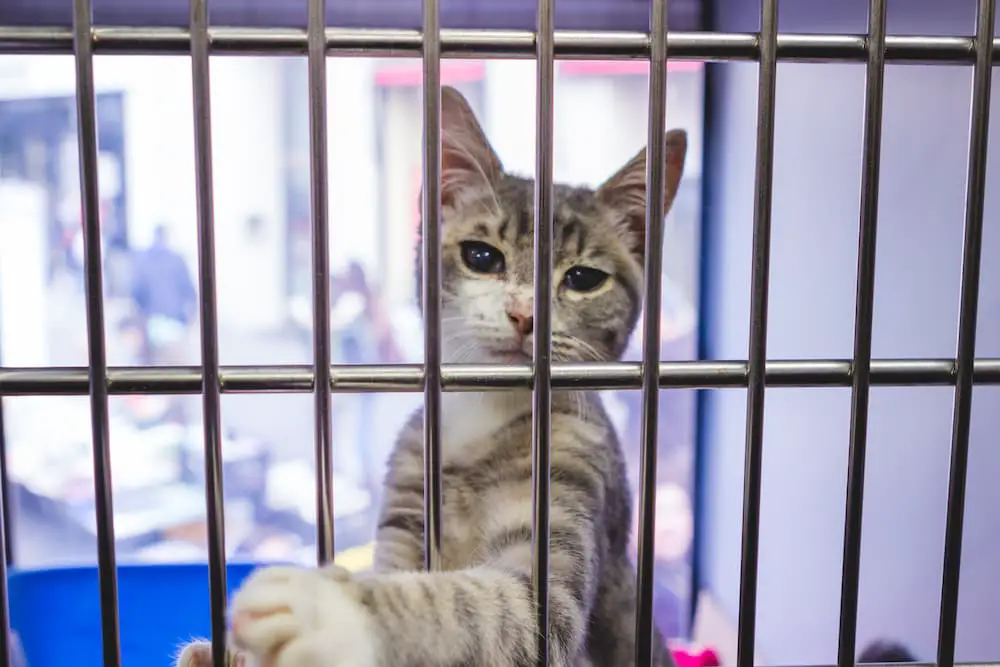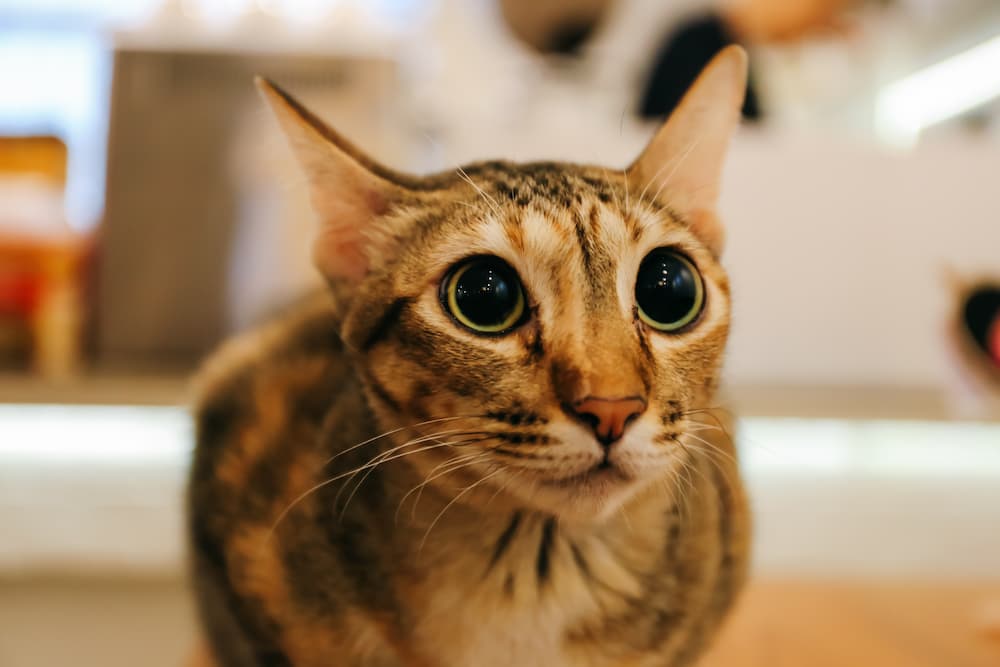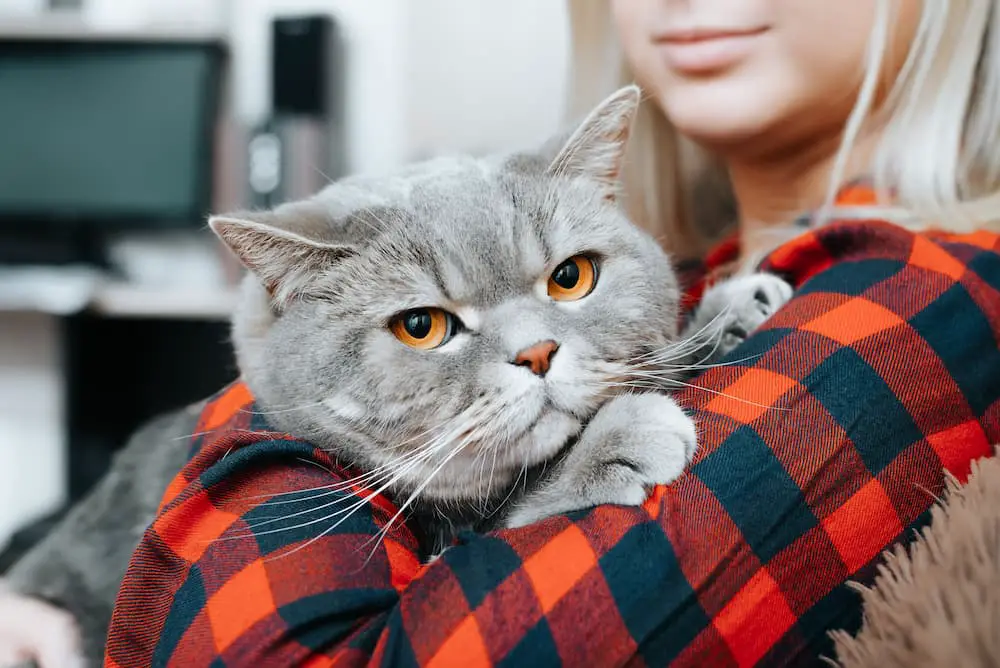Are you fed up with a feline that stopped using the litter box? Concerned for a cat who’s sleeping a lot? Or, not sure if what your kitty does is normal? These are all questions you should ask a veterinarian. Dr. Liz Bales is here to answer your kitty questions about health, wellness, and behavior!
 Hi, I have a question about the 8 cats I have 3 females, and 5 males. All neutered and spayed. Why is it that some are spraying urine in my house on furnitures and yesterday found a puddle of pee in the dining room floor in a corner hardware floor. I have brought Natures Miracles spray of both kind, and does somewhat help, but I’m still having issues with it, and it’s very frustrated that I’m cleaning up after them constantly. They are all healthy, no medical issues and they are all eating and drinking good. I have had cats all my life, but I’m getting to the point now it’s weary me out. I have an idea who is doing the spraying, but I never could catch them. Thank you, Elizabeth G.
Hi, I have a question about the 8 cats I have 3 females, and 5 males. All neutered and spayed. Why is it that some are spraying urine in my house on furnitures and yesterday found a puddle of pee in the dining room floor in a corner hardware floor. I have brought Natures Miracles spray of both kind, and does somewhat help, but I’m still having issues with it, and it’s very frustrated that I’m cleaning up after them constantly. They are all healthy, no medical issues and they are all eating and drinking good. I have had cats all my life, but I’m getting to the point now it’s weary me out. I have an idea who is doing the spraying, but I never could catch them. Thank you, Elizabeth G.
Hi Elizabeth!
Thank you for your question. This is a problem that so many cat lovers share and one that can be very hard to live with. If the answer were an easy one, I am quite sure you would have resolved the problem with all of your effort.
Cats urinate outside of the box for many reasons, including litter box maintenance, medical conditions, stress, marking, intercat problems and a lack of environmental enrichment.
Let’s start with litter box maintenance. How many litter boxes do you have in your house? The rule of thumb is that you need one more litter box than the number of cats in your house. For you, that means 9 litter boxes. But, that also means 9 separate locations for the litter boxes in your living space, not 9 litter boxes grouped together in a single location. This can be very difficult to achieve, but worth the effort. Cats handle conflict by avoidance. When you provide multiple and separate resources for litter boxes, you allow them to avoid each other and conflict diminishes…and so does urinating outside of the box.
Cats prefer clean, unscented litter boxes that are NOT covered and NOT mechanized. Cats do not like the unpredictability or the noises from self cleaning litter boxes. In addition, cats like a quiet litter box area, away from washing machines, heaters etc. They like to use a clean, unlined litter box (can you blame them?), that is scooped twice a day and dumped once a week.
If you have got all of this covered, and are still having issues with urinating outside of the box, it is time to look away from the more obvious urine and litter and look at your cat’s environment. An environment that is perceived as stressful by your cats, could be causing them to urinate outside of the litter box. Feline environmental enrichment (FEE) is essential to decreasing stress in the indoor environment.
What is feline environmental enrichment? The human home is made just right for humans, but it lacks some things that are essential to the health and happiness of cats. Cats are both predator and prey. To feel happy and relaxed they need opportunities to hunt and places to hide. Here is a quick low down of Feline Environmental Enrichment (FEE)
5 STEPS TO IMPROVING FELINE ENVIRONMENTAL ENRICHMENT

1. Create a Safe Space.
In nature, cats are prey. Being exposed can make them feel vulnerable and stressed. Cats have a strong instinct to hide to feel safe and relaxed. You can provide this with beds, boxes, perches, cat trees and shelves.
2. Give Cats Multiple and Separate Key Resources.
Cats handle conflict by avoidance. They get along best when they don’t have to share. Cats need multiple “key resources” (litter boxes, scratching posts, resting places, water and food sources) in separate areas of the living space.
3. Provide an Opportunity to Hunt.
 Cats need to hunt to be physically and mentally healthy. In nature, cats hunt between 9 and 20 times a day, 24 hours a day. Cats spend most of their waking hours hunting for food. Simply feeding from a bowl does not provide the stimulation that they need. Cats should hunt for and eat multiple small meals a day—not gorge from a bowl. In addition, cat are solitary hunters that prefer to hunt and eat alone. Forcing them to share a single location for food can cause conflict that leads to stress and urinating outside of the litter box. For the solution to this problem, check out The NoBowl Feeding System at www.NoBowlCat.com
Cats need to hunt to be physically and mentally healthy. In nature, cats hunt between 9 and 20 times a day, 24 hours a day. Cats spend most of their waking hours hunting for food. Simply feeding from a bowl does not provide the stimulation that they need. Cats should hunt for and eat multiple small meals a day—not gorge from a bowl. In addition, cat are solitary hunters that prefer to hunt and eat alone. Forcing them to share a single location for food can cause conflict that leads to stress and urinating outside of the litter box. For the solution to this problem, check out The NoBowl Feeding System at www.NoBowlCat.com
4. Provide Positive and Predictable Human Interaction.
Play with each of your cats every day! Cats benefit from daily play with their humans for at least 15 minutes a day. When you end any play session, allow your cat to “catch” its prey and give your cat a food reward to complete their natural hunting, catching and eating ‘seeking cycle’.
5. Provide an Environment that Respects Your Cat’s Sense of Smell.
A cat’s sense of smell is 15x stronger than a human’s. Cats need to engage their exquisite sense of smell to hunt for their food. Likewise, cats dislike certain smells—especially citrus! Use unscented soaps to clean their litter box and avoid scented air fresheners and carpet cleaners in their spaces.
The answer to your cat pee problems, may be remedied by looking at your overall environment. I hope this helps!
Sincerely,
Dr. Liz Bales, VMD
 For more cat health and wellness information, check out my website at www.TheCatvocate.com and LIKE me on Facebook by clicking here.
For more cat health and wellness information, check out my website at www.TheCatvocate.com and LIKE me on Facebook by clicking here.
Dr. Liz Bales, The Catvocate, is a practicing veterinarian with 15 years of experience. Dr. Bales has a strong interest in feline wellness and behavior. She believes that by understanding the natural state of the cat we can create an indoor environment where cats thrive and our bond with them grows.
Dr. Bales is interested in your questions and concerns about your cat! Leave your question in a comment below and Dr. Bales just might answer your question next!







